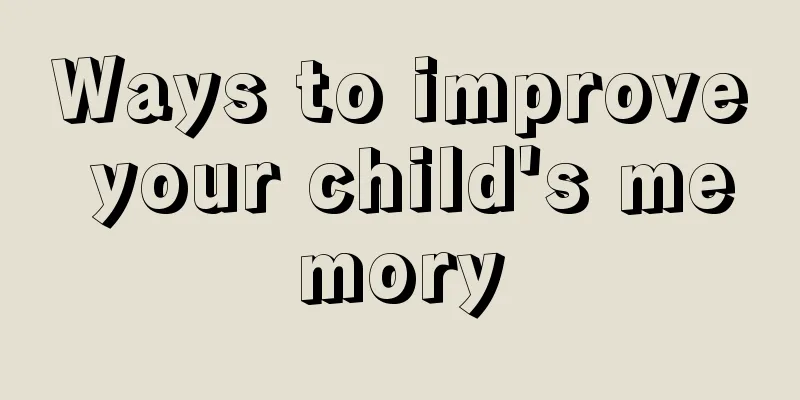What to do if your baby keeps biting his lower lip

|
Today, many parents have discovered that their babies have the habit of biting their lower lips all the time. They are very worried about this, and some parents even wonder if their children have any disease. What should I do if my baby keeps biting his lower lip? I think this must be a question that many parents would like to know the answer to, so let’s learn about the solution together. 1. Make an agreement with the dentist that if you bring a child, ask him to say to the child: "Don't bite your lips" (or gesture to him not to bite his lips, because he is still young and may not understand this sentence). This is much more powerful than saying it yourself. 2. We cannot force a child to change bad habits. We must give him the motivation to change. This motivation can come from a family friend, an elder who doesn’t hang out with them, a relative, or a teacher. If they say that this habit is bad, they will dislike him; if he changes it, they will like him. 3. Don’t put too much pressure on him and don’t nag him, because pressure and nagging will make him feel that he is being noticed, and children love to be noticed. Due to his rebellious psychology, he will perform habitual actions more often, such as sucking his lips. 4. Use substitutes to "occupy" your mouth. For example, talk to him and let him answer; eat things that need to be chewed (such as biscuits); sing; blow feathers; blow a trumpet, etc. 5. Give rewards. The reward you give him must be something he likes, such as hawthorn chips, potato chips, candy, raisins, etc. Make it clear to him that he will give it to you if you don't bite your lip. Connect "not doing a certain behavior" (such as biting your lip) with "getting some benefit". He might give up something to get something. Of course, she is still young and it is still difficult for her to understand this cause and effect relationship, but if you talk more, she will slowly understand it. 6. When she is a little older and still bites her lips, you can apply some berberine water on her lower lip to make her feel disgusted and give up. There are several reasons why people bite their lips: 1. The sucking instinct is not satisfied; 2. Seek excitement. Biting your lips puts a certain amount of pressure on your lips, which is quite stimulating; 3. When you are lonely and have nothing to do, you look for someone to rely on. This is a kind of reliance. Before helping your child break this bad habit, you should first examine whether you have neglected your child's emotional needs. After adjusting the external environmental factors, you may try the following methods: 1. Ignore it. You need to adjust your mentality. It is not a big problem for a child to bite his lips. When a child bites his lips, don't pay attention to him. Parents are too nervous or use inappropriate correction methods, such as blaming, beating and scolding. This will increase the child's psychological burden, strengthen the child's consciousness and create a vicious circle. Many of the children's actions are often unconscious. You can also divert your child's attention to other aspects, such as teasing him with toys and having more conversations with him. 2. When a mother feeds her child, she not only provides nutrition to the child, but also gives him love and warmth. 3. Don't leave your child alone in one place, such as in bed, for too long, so that he doesn't get bored and bite his lips. Eating teething biscuits in moderation will not have a negative effect on the baby's stomach. Generally, a 3-month-old baby can turn over from lying on his back to lying on his side. At this time, parents can train the baby to turn over. If the child has the habit of sleeping on his side, it is easier to learn to turn over. Just put an interesting toy or a mirror on his left side, put his right leg on his left leg, put one hand between his chest and abdomen, lightly support his right shoulder, and gently push to the left from behind, and the baby will turn to the left. After practicing a few times, parents do not need to push, just put the legs in place and use toys to tease the baby and he will turn over by himself. From now on, you can do a 90-degree rollover just by using the toy without having to put down your legs. The same method can be used later to help children turn from prone position to supine position. If the baby is not used to sleeping on his side, parents can let him lie on his back in bed. The adult can hold toys that the child is interested in and can make sounds on both sides of the child to tease him, and say to the baby kindly: "Baby, look at what a beautiful toy!" to train the child to turn from supine position to side position. After the child completes the action, you can give him the toy to play with for a while as a reward. Children usually learn to roll over from supine to prone first, and then learn to roll over from prone to supine. They usually train 2 to 3 times a day, each training session lasting 2 to 3 minutes. After 3 or 4 months, babies can lift their heads better and like to be held upright. At this time, when you take your baby out to play, you can change the way you hold him. It is best to hold the baby upright, put one hand under the baby's buttocks, and support his back with the other hand, so that the baby can see the outside world more easily. You can hold the baby for about 10 minutes each time. What should I do if my baby keeps biting his lower lip? We have already given us the corresponding solutions in the class. I believe everyone should know the solution to this situation. If your baby also has the problem of biting his lower lip all the time, you can try the above method to solve it. |
<<: What are the factors that cause vision loss in children?
>>: Is patent ductus arteriosus serious in newborns?
Recommend
What are the symptoms of cerebral palsy in premature babies?
Premature babies are prone to illness, so they us...
What is the focus of education for children under three years old?
Most parents think that before the baby is three ...
Why does a child sweat on his head when sleeping at night?
We all know that sweating is actually a nerve ref...
What should I do if my child has poor digestion?
Children's poor gastrointestinal digestion ma...
What to do if your 10-month-old baby can't roll over
The baby will begin to grow slowly after birth, s...
Psychological education for children between 0 and 7 years old
Children's education is a very important cour...
The child always feels itchy when sleeping
Children's skin is relatively delicate and is...
What causes baby's face to turn red?
In winter, the outdoor temperature is relatively ...
What should I do if my baby doesn't cough during the day but coughs at night?
There is a reason why your baby doesn't cough...
Causes of scabs on baby's eyebrows
Many babies will have scabs on their heads and fa...
The child's face is red and his ears are red
There are both physiological and pathological fac...
What is the reason for the baby's forehead to be black?
There are many phenomena in the growth and develo...
What causes urine leakage in children?
What is the reason for urine leakage in children?...
Why does my child have leg pain in the middle of the night?
Some parents always encounter the situation that ...
Should babies be bathed every day?
Many parents bathe their newborn babies every day...









